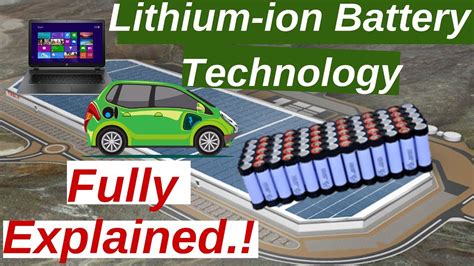The world of technology is rapidly evolving, and one of the most crucial components driving this evolution is battery technology. The development of new battery technologies has been instrumental in shaping the modern world, from the widespread adoption of electric vehicles to the proliferation of portable electronic devices. In recent years, significant advancements have been made in newer tech battery technology, enabling devices to become smaller, more efficient, and environmentally friendly.
What's Driving the Need for New Battery Technologies?

The demand for new battery technologies is being driven by several factors, including the increasing adoption of electric vehicles, the proliferation of portable electronic devices, and the need for more efficient and environmentally friendly energy storage solutions. Traditional battery technologies, such as lead-acid and nickel-cadmium, are facing significant challenges in meeting these demands due to limitations in their energy density, power output, and environmental sustainability.
The Emergence of Lithium-Ion Batteries
Lithium-ion batteries have revolutionized the field of battery technology in recent decades. These batteries have become the dominant technology for portable electronics and electric vehicles due to their high energy density, long cycle life, and relatively low self-discharge rate. Lithium-ion batteries work by storing energy in the form of lithium ions that move between two electrodes, a positive cathode and a negative anode, through an electrolyte.
Despite their widespread adoption, lithium-ion batteries still have limitations, including relatively high costs, limited energy density, and potential safety concerns due to overheating and flammability.
Advancements in Newer Tech Battery Technologies
Several newer tech battery technologies have emerged in recent years, offering improved performance, efficiency, and sustainability. Some of the most promising advancements include:Solid-State Batteries
Solid-state batteries replace the traditional liquid electrolyte with a solid material, enhancing safety, energy density, and charging speeds. This technology has the potential to significantly improve the range and efficiency of electric vehicles while reducing production costs.
Lithium-Air Batteries
Lithium-air batteries, also known as lithium-oxygen batteries, have the potential to offer significantly higher energy density than traditional lithium-ion batteries. This technology works by reacting lithium with oxygen from the air to generate electricity, which could lead to a major breakthrough in electric vehicle range and efficiency.
Graphene-Based Batteries
Graphene, a highly conductive and flexible material, is being explored for its potential to improve battery performance. Graphene-based batteries could offer faster charging times, higher energy density, and improved durability.
Sodium-Ion Batteries
Sodium-ion batteries are being developed as a potentially more cost-effective and sustainable alternative to lithium-ion batteries. Sodium is abundant and inexpensive, which could lead to lower production costs and increased adoption of electric vehicles.
Challenges and Future Directions
While these newer tech battery technologies show great promise, significant challenges need to be overcome before they can be widely adopted. Some of the key challenges include:- Scaling up production while reducing costs
- Improving energy density and power output
- Enhancing safety and durability
- Addressing environmental concerns and sustainability

Conclusion
Advancements in newer tech battery technologies have the potential to revolutionize the way we live and work. From electric vehicles to portable electronics, these technologies will play a crucial role in shaping the future of energy storage. While significant challenges remain, the benefits of improved performance, efficiency, and sustainability make these technologies an exciting and essential area of research and development.We hope this article has provided you with a comprehensive overview of the latest advancements in battery technology. What are your thoughts on the future of energy storage? Share your comments and insights below!






What is the main advantage of solid-state batteries?
+Solid-state batteries offer improved safety, energy density, and charging speeds compared to traditional lithium-ion batteries.
What is the potential benefit of graphene-based batteries?
+Graphene-based batteries could offer faster charging times, higher energy density, and improved durability.
What is the main challenge facing the adoption of newer tech battery technologies?
+Scaling up production while reducing costs is a significant challenge facing the adoption of newer tech battery technologies.
